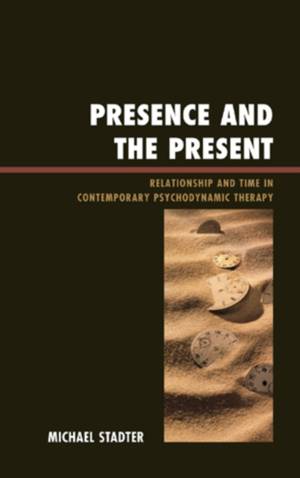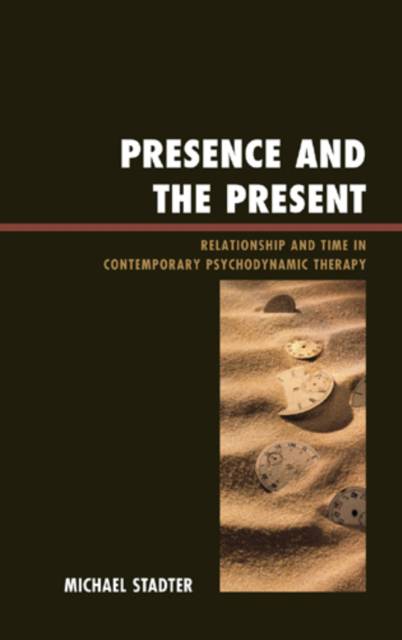
- Afhalen na 1 uur in een winkel met voorraad
- Gratis thuislevering in België vanaf € 30
- Ruim aanbod met 7 miljoen producten
- Afhalen na 1 uur in een winkel met voorraad
- Gratis thuislevering in België vanaf € 30
- Ruim aanbod met 7 miljoen producten
Zoeken
Presence and the Present
Relationship and Time in Contemporary Psychodynamic Therapy
Michael Stadter
€ 213,95
+ 427 punten
Omschrijving
Presence and the Present: Relationship and Time in Contemporary Psychodynamic Therapy offers salient points learned from the author's forty years of practice and teaching, and applies psychodynamic psychotherapy to the contemporary practice climate. Emphasizing the therapeutic relationship and the dimension of time, it grounds the discussion in clinical application. Including more than fifty vignettes and four extended case presentations, the author deconstructs successful interchanges as well as errors. Part I sets out central themes and components of this contemporary view of dynamic therapy while part II examines present-day applications. Part I begins with an overview of the core (the relationship) and the contours (characteristics) of therapy and some of the challenges therapists face today. The ten contours discussed are the frame, uniqueness, not knowing, different types of knowledge, mentalization, the therapist's use of self, goals beyond symptom relief, integration with nondynamic approaches, integration with neuroscience and therapy outcome research, and, finally, the use of time and space. Following a discussion of these ten contours, the book summarizes evidence-based relationship elements in therapy and the robust empirical research demonstrating dynamic therapy's effectiveness, while providing a theoretical overview for therapists not familiar with psychodynamic theory. The last two chapters of part I examine the complex relationships among time, life, and psychotherapy and continue the exploration of therapy duration, the present moment, transience, unending therapy, and termination. Part II of Presence and the Present begins with two chapters on the therapy of trauma. Chapters 8 and 9 discuss the phenomena of trauma and include practical recommendations and frequent therapist countertransferences. Chapter 10 focuses on the organization of self experience through bodily sensations and offers a nuanced model to understand physical elements of transferences and countertransferences. The final three chapters explore therapy with couples who are struggling with disturbed adult or adolescent children, integrate cognitive-behavioral interventions with the dynamic approach, and examine the frequent and key affect of shame in psychotherapy.
Specificaties
Betrokkenen
- Auteur(s):
- Uitgeverij:
Inhoud
- Aantal bladzijden:
- 288
- Taal:
- Engels
- Reeks:
Eigenschappen
- Productcode (EAN):
- 9780765706553
- Verschijningsdatum:
- 20/12/2011
- Uitvoering:
- Hardcover
- Formaat:
- Genaaid
- Afmetingen:
- 152 mm x 229 mm
- Gewicht:
- 594 g

Alleen bij Standaard Boekhandel
+ 427 punten op je klantenkaart van Standaard Boekhandel
Beoordelingen
We publiceren alleen reviews die voldoen aan de voorwaarden voor reviews. Bekijk onze voorwaarden voor reviews.











